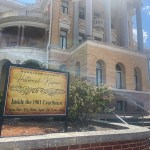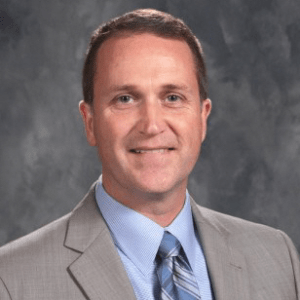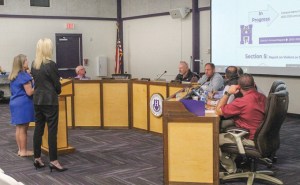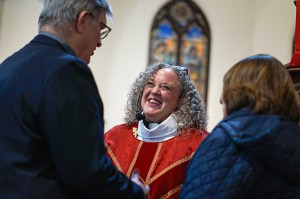Harrison County Historical Museum feels effects of federal funding cuts
Published 11:18 pm Monday, August 4, 2025


Exhibits and staffing at the Harrison County Historical Museum have been impacted by a presidential executive order that calls for the elimination of the Institute of Museum and Library Services and the cancellation of National Endowment for the Humanities grants.
“With the changes of how they’re funded and the trickle down to the states, Humanities Texas lost 65 percent of their budget,” said museum Director Tina McGuffin, noting Humanities Texas is the state affiliate of the National Endowment for the Humanities.
“Most of that is who (the museum gets) grant money from,” she said. “And with that, it ended that grant program, and so we lost 20% of our funding for going into next year.”
Trending
“So it’s been rather interesting,” she said.
According to USA Today, President Donald Trump’s order issued in March eliminated the Institute of Museum and Library Services “to the maximum extent consistent with applicable law,” stating that the institute must be reduced to its “statutory functions.”
A proposal would cut federal funding for libraries and museums from nearly $300 million to $5.5 million, USA Today reported.
According to NPR.org, hundreds of arts groups of various sizes across the nation received emails notifying them of the withdrawal and termination of their grants just hours after Trump proposed eliminating the National Endowment for the Arts (NEA) from the federal budget.
The NEA updated its grant-making policy priorities to focus funding on projects as prioritized by the president and terminated grants that fall outside of those priorities, NPR reported.
NPR additionally reported that termination notices sent by the National Endowment for the Humanities were similar, notifying grant recipients that the agency was “repurposing its funding allocations in a new direction in furtherance of the President’s agenda.”
Trending
The priorities identified in Trump’s agenda include: “Projects that elevate the Nation’s independence, foster AI competency, empower houses of worship to serve communities, assist with disaster recovery, foster skilled trade jobs, make America healthy again, support the military and veterans, support Tribal communities, make the District of Columbia safe and beautiful, and support the economic development of Asian American communities,” NPR and PBS reported.
Harrison County’s museum received its first notification of funding cuts shortly after submitting its grant request for the new fiscal year to Humanities Texas. In the notification letter emailed April 15, Marco Buentello, director of grants for Humanities Texas, said the organization’s federal funding from the National Endowment for the Humanities had been terminated, but alternative funding sources were being sought.
The same day, 20 minutes later, the agency sent a second emailed notification, confirming that there would be no funding for grants submitted for the 2025-26 cycle. Buentello said he was sorry to share that Humanities Texas’ statewide grant-making had been immediately suspended due to recent funding cuts mandated by the National Endowment for the Humanities, its longtime federal partner, which provided funding to aid the agency in its mission to support humanities programming across the state.
“Their major grant cycle generally runs from July 1 to June 30. So all grant applications submitted were unfundable,” McGuffin said.
Grants from Humanities Texas have funded various exhibits at the Harrison County museum through the years, including the 2020 traveling exhibit “The Way Things Were,” which was a photographic exhibition of Texas settlers and their structures from 1860 to the 1930s, and a 2021 traveling exhibit titled “Citizens at Last: The Woman Suffrage Movement in Texas.”
Besides traveling exhibits, McGuffin said the grants also sponsored the museum’s rotating exhibits such as “Places in the Heart,” an ongoing spotlight of Harrison County communities.
Grant funding additionally paid for various other initiatives, including the museum’s digital imaging project.
“It has also funded a lot of our preservation things that go on down at the research center,” McGuffin said of the museum’s Inez Hatley Hughes Historical Research Center. “They fund a lot of our preservation supplies.”
Most importantly, the grants supported some of the museum staff’s salaries.
“So it’s like a big void there that we’ve got to try and fill,” McGuffin said. “We’ve already eliminated one staff position going into next year. We had a staff member leave, and because of the lack of funding, we’ve just eliminated that position, which is one of our visitor services clerks.”
She said that means the museum doesn’t have anyone manning the Service and Sacrifice military exhibit at Memorial City Hall. The permanent state-of-the-art exhibit honors Harrison County veterans of all eras.
McGuffin said the loss of funding comes at a critical time when the museum is experiencing growth not only in visitors, but locations, too.
“We operate in four locations now,” she said, noting locations include inside the historic courthouse, Memorial City Hall, the research center and now the north gallery at Marshall Mercantile.
She said the museum does the best it can covering all locations with a part-time staff but rely on grant funding and donations to continue to operate effectively.
“We’re experiencing growth. We’re experiencing lots of visitors. Our visitor level has upticked quite a bit,” McGuffin said. “Our researchers have upticked a whole lot. I mean, we’re having several researchers every week, and so we’re trying to shuffle to be sure that everybody understands how to handle all of them, so we still have four staff members, and we are shuffling to cover everything. But if we don’t find ways to make up that difference, then, you know, for a place that operates on donations and grants, you’re looking at cutting hours or cutting staff. Our staff currently is part time staff. We’re all part-time.”
“Because we operate by donations and grant money, and that’s what funds us every year and enables us to keep the doors open and things funded, and be able to buy preservation supplies like boxes and buy folders, (it’s a great loss),” she added.
In the meantime, the museum is continuing its fundraising efforts and ongoing membership drive to help keep programs afloat. Donations are always accepted.
“We’ve got some fundraising events that are going to be coming up, and we’ve started our membership renewal,” McGuffin said. “We just want everybody to renew their memberships and make donations.”
In addition to monetary support, McGuffin said volunteers also are needed to assist at the museum, particularly at the Service and Sacrifice gallery at Memorial City Hall.
“We’re looking for volunteers that can cover some of these things,” she said. “Those volunteer hours, they help us out.”
McGuffin said the museum also accepts donations of supplies.
“I tell people (who may) have an extra box of file folders or hanging file folders, or have a file cabinet …. because not only are we experiencing all this growth, our donations, in terms of artifacts, have increased,” she shared.
Anyone interested in learning more about donations, membership or volunteer opportunities may email the museum at hchminfo@gmail.com or call (903) 935-8417, ext. 1,or visit the museum’s website at harrisoncountymuseum.org.
“There are some fundraising things that we’re going to be doing that are pushing us out of our comfort zone, too. It’s something that we’ve not really had to do that type of thing before, but hey, we can do it,” McGuffin said. “I have a great board. I have some great volunteers that help with the research center. And so I think we can overcome this, especially with the support of the community. And we do have some people in this community that are so diligent. I mean, every month, they’ll send us a little monthly donation or they’ll send us a check.
“There are some great people in this community that this is important to them — preserving this,” she said.
McGuffin said the museum will be celebrating its 60th anniversary in October and looks forward to continuing to serve as it overcomes funding challenges.
“I’m not trying to say, ‘Oh, woe is us.’ But I think it’s important for people in the community to know what’s going on and how decisions at the federal and state level impact at the local level,” McGuffin said, “because, sometimes we think that, ‘Oh, well, you know, that’s (just) Texas Humanities’ (issue). But hey, that has an impact here. Even with IMLS, that impacts libraries — all these cultural things.”
McGuffin said the museum prides itself on offering a free quality service for families to enjoy.
“We do everything by donation, so we don’t charge for any of our services, and I want to keep it that way,” she said. “I believe that museums should be accessible to everyone. We want it to be accessible. I think that’s one of the reasons that our visitors have picked up so much is because we do not charge. We ask for a donation, and if you can’t leave one, that’s fine.
“I want to be the best small county museum and the best historical research center in the area. I want to be that. That’s what we strive to do every day.”








